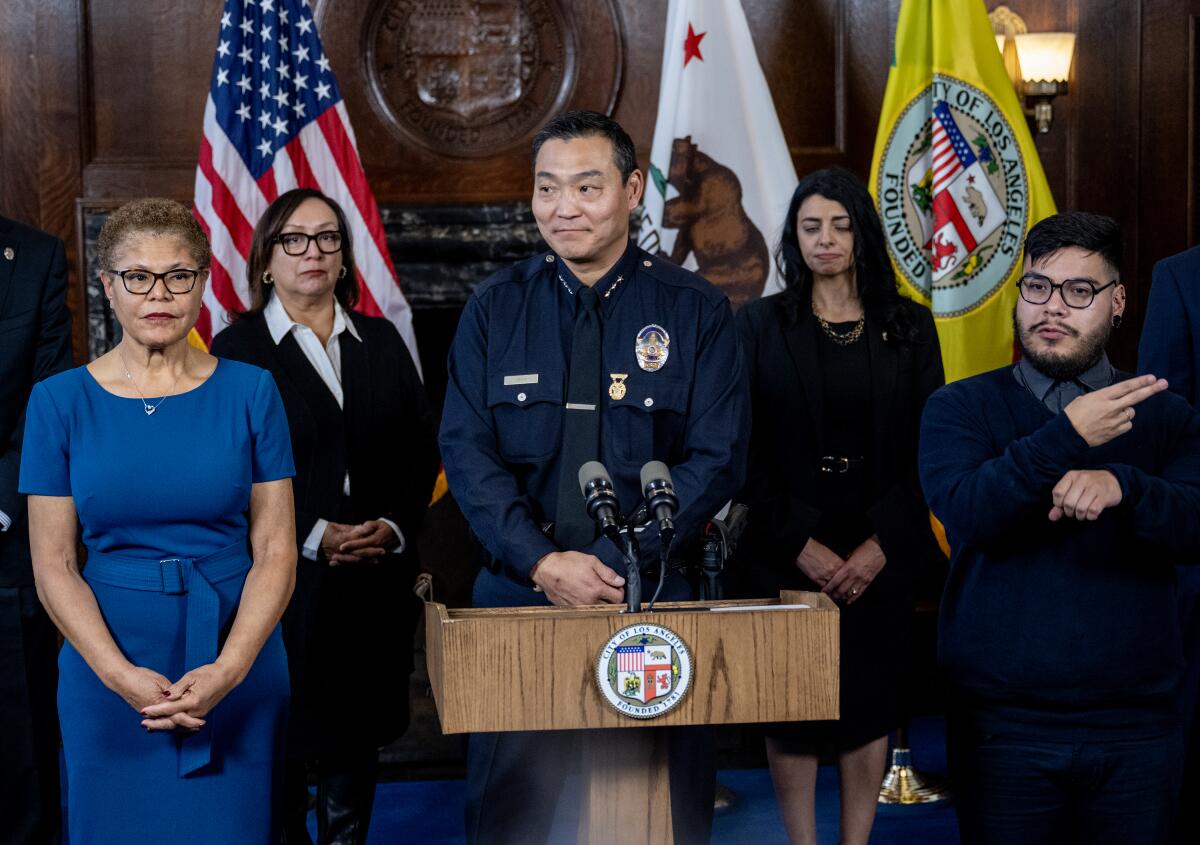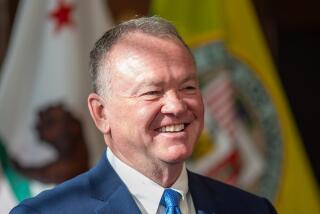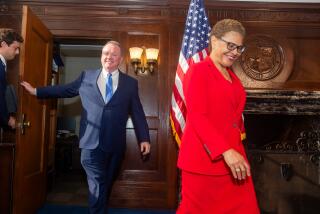Dominic Choi picked as interim LAPD chief to replace departing Moore

The city of Los Angeles will have a new top cop, if only for the next six or so months.
Three weeks after Los Angeles Police Department Chief Michel Moore’s said he will step down at the end of February, the city’s Police Commission announced Wednesday that Assistant Chief Dominic Choi would take over as interim chief effective March 1. Choi was selected in a unanimous vote by the five-member commission.
The assignment is expected to last only until mid-summer, while a nationwide search is conducted to find a more permanent replacement. Choi becomes the 58th chief in the LAPD’s history, and the first of Asian descent.
At a news conference that followed the commission meeting, Mayor Karen Bass introduced Choi, lauding the 28-year LAPD veteran for his “intimate knowledge of the LAPD, his belief that we will continue to reform how we police, and his strength of character.”
Choi’s name was among several that had circulated around police headquarters and City Hall for months as a potential candidate.
In picking Choi, the Police Commission went with someone widely viewed as a safe pick, an experienced policing executive whose encyclopedic knowledge of the department has helped him soar up the ranks. He also represents a consummate insider, having worked for Moore, first as an aide and later as his chief of staff.
For the record:
9:13 a.m. Feb. 8, 2024An earlier version of this article stated that Dominic Choi was recently elevated to the position of assistant chief, replacing Roberto Marino. Choi was promoted in 2021. Another assistant chief, Blake Chow, replaced Marino.
Choi joined the department in 1995 and was elevated to assistant chief in 2021. Before moving into an administrative role, he worked as a detective and supervisor, with stints in internal affairs, and later became the department’s homeless coordinator. Over the years, he occasionally filled in as acting chief while Moore was away.
At the news conference with Bass, Choi thanked his wife, the mayor and Moore, who he said had given him opportunities that “prepared me and shaped me for this job as interim chief.”
“I’ll be available not only to you and the commission but to the personnel of the LAPD and to the public,” Choi said to the mayor.
When it came his turn to speak, Moore praised Choi for possessing “a comprehensive combination of extensive knowledge of department operations at all levels with extraordinary people skills and team-building capabilities.”
Commission President Erroll Southers said Choi stood out among the candidates for his deep institutional knowledge and continued commitment to reform.
From Day 1, he will be expected to step in and run the LAPD, a massive, multibillion-dollar organization of more than 10,000 employees that is unlike most police departments. As interim leader, he will likely be asked to make decisions related to officer discipline and promotions.
“My philosophy as interim chief is not to go in there and turn everything upside down,” Choi said. He said the biggest challenges he faces are hiring and retention.
He said he intends to focus on officer morale and wellness, and said that the department will be prepared to respond to calls involving mental illness and homelessness and to handle mass protests.
When a reporter asked him what, if anything, he planned to change about the department, Choi hesitated for several seconds before saying he would focus on “developing the strategic plan that we already have.”
On being the first chief of Asian descent, Choi said: “I proudly represent that community, but just to be absolutely clear, my role is to represent all the communities throughout this city.”
Choi’s appointment followed a special meeting of the Police Commission, the department’s civilian policymaking body. After a brief public comment, the body retreated to deliberate behind closed doors for about an hour.
All three of the speakers who called in to the meeting talked of the need for the department to move on from Moore, and two of them advocated for former L.A. County Sheriff Jim McDonnell to get the job.
One commenter, who goes by the nickname “Steve Rogers” and regularly calls into Commission meetings to advocate for police, called for an “immediate course correction.”
Another caller said the Commission should pick McDonnell, who came up through the LAPD’s ranks before leaving to become police chief in Long Beach, for “his intellect, ability to build a team, proven leadership.”
“His knowledge of the domestic and global landscape allows him to hit the ground running on day one,” the caller said.
Choi emerged from a pool of finalists that LAPD insiders say included three former senior officials who are retired from the department, Sandy Jo MacArthur and Bob Green, as well as current Deputy Chief Michael Rimkunas. A spokesperson for the Police Commission said that the original pool of applicants included 10 names; that list was winnowed to five finalists, who were each interviewed by the oversight body. Choi was interviewed a second and final time during Wednesday’s closed door session.
Choi said that the commission made clear early on that anyone who competed to be interim chief would not be allowed to apply for the permanent job.
Deputy Chief Donald Graham said that Choi’s skillset, not his ethnicity, is the reason he got the job, but that it’s hard to ignore the significance of the moment given the country’s legacy of racism and discrimination toward Asian Americans that continues to this day, notably with a spike in anti-Asian hate attacks in 2021.
“Obviously, these are problems that we are going to continue to have to contend with, but seeing diversity continue to develop in leadership roles ... is a step in the direction of healing,” said Graham, a Filipino American who was a classmate of Choi’s at the LAPD Academy.
In announcing his departure, Moore said he was proud of his career at the department and had made the decision to leave in order to spend more time with his family. He also reiterated his denial of a report that he had ordered two detectives to investigate a USC scholarship Bass received when she was a member of Congress representing parts of Los Angeles County.
Bass has denied any wrongdoing in accepting the scholarship, and the House Committee on Ethics cleared her request to accept the tuition award.
The mayor has repeatedly said that Moore’s departure had nothing to do with the USC allegations, and the two leaders have presented a unified front in several public appearances in the weeks since. At another news conference late last month to discuss falling violent crime rates, Bass repeatedly praised Moore for his steady leadership.
Moore’s backers say he has shepherded the department through a period of unprecedented upheaval shaped by a worldwide pandemic and a social uprising that followed the police murder of George Floyd in Minneapolis. They also point to his continued support of reforms in the wake of Floyd’s death and other flash points from 2020, including expanding community outreach efforts and placing new limits on pretextual traffic stops.
Critics who opposed Moore’s reappointment last year to a second five-year term argued that the size, scope and frequency of scandals during his tenure reflected a poor track record for any leader. His second term brought further controversies, including gang officers accused of theft, illegal stops and searches, senior staffers engaged in inappropriate relationships with subordinates and what officials called an inadvertent release of photos of undercover officers.
Moore said before his reappointment last year that he would only serve for two or three years before turning the department over to a new chief ahead of the 2028 Olympic Games and other major sporting events the city is set to host. He said he wanted to continue reforms on use of force and diversity and avoid a “haphazard” transition. He said he would spend the next few years laying the groundwork for a succession plan.
For months, speculation has swirled about whether Bass would seek to make a statement by appointing a woman or a Latino for the first time in the department’s long history.
Moore said Wednesday that he was confident in the commission’s ability in the coming months to identity “qualities and attributes of the next chief of police.”
Whoever Bass, with the the Police Commission’s help, ultimately picks as the city’s next chief will have to confront some of the same intertwined problems facing law enforcement here as elsewhere, including concerns about officer morale, use of force, allegations of racial profiling and how to respond to issues involving traffic, substance abuse and homelessness. While violent crime has receded from its pandemic highs, the department is also smaller — by hundreds of officers — and continues to face recruitment challenges.
In the past, the city has worked with outside consultants to conduct nationwide searches for a chief capable of leading under the intense microscope the department faces. The choice has often come down to picking between an experienced outsider, who isn’t beholden to any established political power structure, or promoting an insider who has deep institutional knowledge of the force, its rank-and-file members and the city they’re tasked with protecting.
Times staff writer Kevin Rector contributed to this report.
More to Read
Sign up for Essential California
The most important California stories and recommendations in your inbox every morning.
You may occasionally receive promotional content from the Los Angeles Times.











